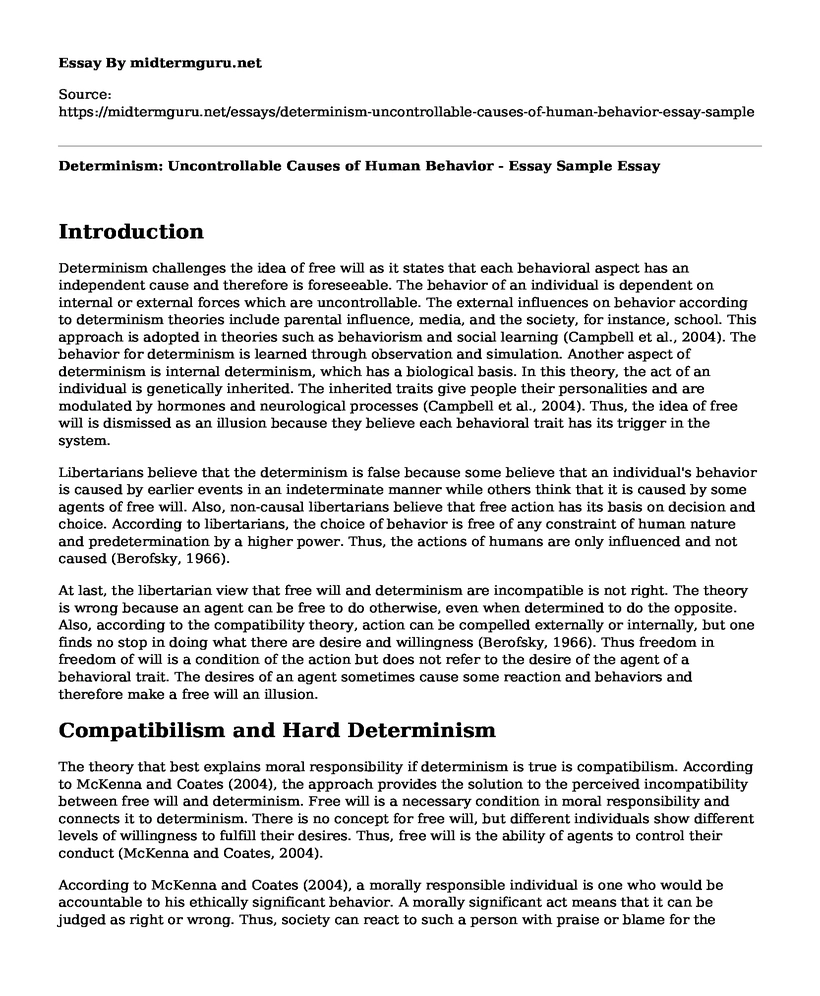Introduction
Determinism challenges the idea of free will as it states that each behavioral aspect has an independent cause and therefore is foreseeable. The behavior of an individual is dependent on internal or external forces which are uncontrollable. The external influences on behavior according to determinism theories include parental influence, media, and the society, for instance, school. This approach is adopted in theories such as behaviorism and social learning (Campbell et al., 2004). The behavior for determinism is learned through observation and simulation. Another aspect of determinism is internal determinism, which has a biological basis. In this theory, the act of an individual is genetically inherited. The inherited traits give people their personalities and are modulated by hormones and neurological processes (Campbell et al., 2004). Thus, the idea of free will is dismissed as an illusion because they believe each behavioral trait has its trigger in the system.
Libertarians believe that the determinism is false because some believe that an individual's behavior is caused by earlier events in an indeterminate manner while others think that it is caused by some agents of free will. Also, non-causal libertarians believe that free action has its basis on decision and choice. According to libertarians, the choice of behavior is free of any constraint of human nature and predetermination by a higher power. Thus, the actions of humans are only influenced and not caused (Berofsky, 1966).
At last, the libertarian view that free will and determinism are incompatible is not right. The theory is wrong because an agent can be free to do otherwise, even when determined to do the opposite. Also, according to the compatibility theory, action can be compelled externally or internally, but one finds no stop in doing what there are desire and willingness (Berofsky, 1966). Thus freedom in freedom of will is a condition of the action but does not refer to the desire of the agent of a behavioral trait. The desires of an agent sometimes cause some reaction and behaviors and therefore make a free will an illusion.
Compatibilism and Hard Determinism
The theory that best explains moral responsibility if determinism is true is compatibilism. According to McKenna and Coates (2004), the approach provides the solution to the perceived incompatibility between free will and determinism. Free will is a necessary condition in moral responsibility and connects it to determinism. There is no concept for free will, but different individuals show different levels of willingness to fulfill their desires. Thus, free will is the ability of agents to control their conduct (McKenna and Coates, 2004).
According to McKenna and Coates (2004), a morally responsible individual is one who would be accountable to his ethically significant behavior. A morally significant act means that it can be judged as right or wrong. Thus, society can react to such a person with praise or blame for the behavior exhibited.
Furthermore, compatibilism shows that determinism is compatible with human freedom, which makes individuals will and actions connect. Thus, an individual is entitled to the credit or blame for a particular behavioral trait. However, the freedom of will and freedom of action are different. The compatibilism theory supports the freedom of will and the view that an action is caused by various factors such as the laws of nature, higher beings, for instance, a god, and other determinants (Eshleman, 2014). Human behavior is caused and comes from initial conditions, and thus, it can be judged as good or bad depending on societal standards. In compatibilism, the behavior of an individual is dictated by the circumstances, experience, and knowledge. Every individual tends to act in such a way that he gets the most advantage from the results of the action. However, based on knowledge and experience, one strives to meet the societal standards of behavior to be morally responsible (Eshleman, 2014).
References
Berofsky, B. (Ed.). (1966). Free will and determinism (p. 4). New York: Harper & Row.
Campbell, J. K., O'Rourke, M., & Shier, D. (Eds.). (2004). Freedom and determinism. MIT Press.
Eshleman, A. (2014). Moral responsibility. Retrieved from https://pilotscholars.up.edu/cgi/viewcontent.cgi?article=1001&context=phl_facpubs
McKenna, M., & Coates, D. J. (2004). Compatibilism. Retrieved from https://plato.stanford.edu/entries/compatibilism/
Cite this page
Determinism: Uncontrollable Causes of Human Behavior - Essay Sample. (2023, Jan 24). Retrieved from https://midtermguru.com/essays/determinism-uncontrollable-causes-of-human-behavior-essay-sample
If you are the original author of this essay and no longer wish to have it published on the midtermguru.com website, please click below to request its removal:
- Sustainability of Urban Growth - Essay Example
- Father-Interview: Home Conversation Revealed - Essay Sample
- Alberta Election: Notable Health Promises Made by UCP, NDP, and Alberta Party - Essay Sample
- Creating an Effective Communication Plan: Analyzing Old Practices & Strategies - Research Paper
- Paper Example on Rethinking Race, Class, Language, and Gender
- Mental Illness: Causes Beyond Mood & Thinking - Research Paper
- Socialization: Integrating Into Society & Its Concepts - Essay Sample







